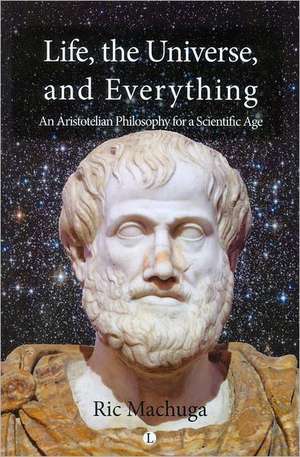Life, the Universe and Everything: An Aristotelian Philosophy for a Scientific Age
Autor Ric Machugaen Limba Engleză Paperback – 29 feb 2012
Preț: 292.64 lei
Nou
Puncte Express: 439
Preț estimativ în valută:
56.00€ • 58.25$ • 46.23£
56.00€ • 58.25$ • 46.23£
Carte indisponibilă temporar
Doresc să fiu notificat când acest titlu va fi disponibil:
Se trimite...
Preluare comenzi: 021 569.72.76
Specificații
ISBN-13: 9780718892739
ISBN-10: 0718892739
Pagini: 324
Dimensiuni: 150 x 226 x 20 mm
Greutate: 0.45 kg
Editura: Lutterworth Press
ISBN-10: 0718892739
Pagini: 324
Dimensiuni: 150 x 226 x 20 mm
Greutate: 0.45 kg
Editura: Lutterworth Press
Notă biografică
Ric Machuga has taught philosophy and in the Honor Program at Butte College for thirty years. He is the author of In Defense of the Soul(2002) and numerous pieces for Books and Culture.
Cuprins
Preface 1 What Is a Good Argument? 2 Has Science Made Philosophy Obsolete? 3 What Is a "Scientific" Proof? 4 What Is Truth? 5 What Is Real? 6 How Do We Know? 7 What Does It Mean to Be Human? 8 Why Should We Care About Morality? 9 Are Humans Really Free? 10 Does God Exist? 11 How Can a Good God Allow Evil? 12 Why Should We Believe in God? Bibliography Index
Recenzii
"Has modern science made philosophy obsolete? According to Ric Machuga, a thread of answer exists, coming from Aristotle to be reinterpreted by Thomas Aquinas. He converses with modern thinkers such as Newton, Darwin and Galileo to show that faith and reason can coexist. What does it mean to be human? Is language relevant for our sense of reality? Is there a God, and if so, how is that He allows the existence of evil? With a synthetic approximation, Machuga undertakes to answer these fundamental questions. He tackles the problems with the Aristotelian method, treating them with logic and reason, and draws a philosophical line of thoughts from Plato and Socrates to Descartes and Nietzsche. In a book that is the result of years directing classes of introduction to philosophy, he demonstrates that Newton and Darwin's reasoning was fundamentally not different from the classical philosophers' one. To study the universe in a scientific way does not mean that we have to endorse the narrow conception of science as positivism upheld it." Dialogo Filosofico, May/August 2012
